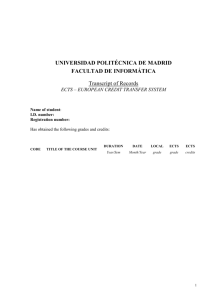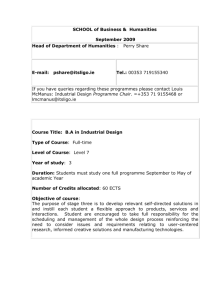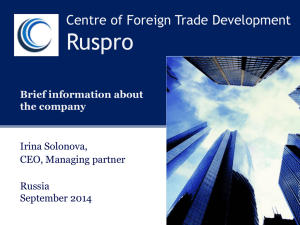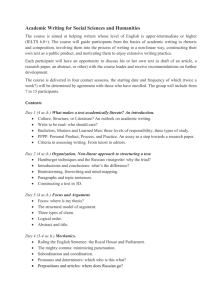annotation of programme
advertisement
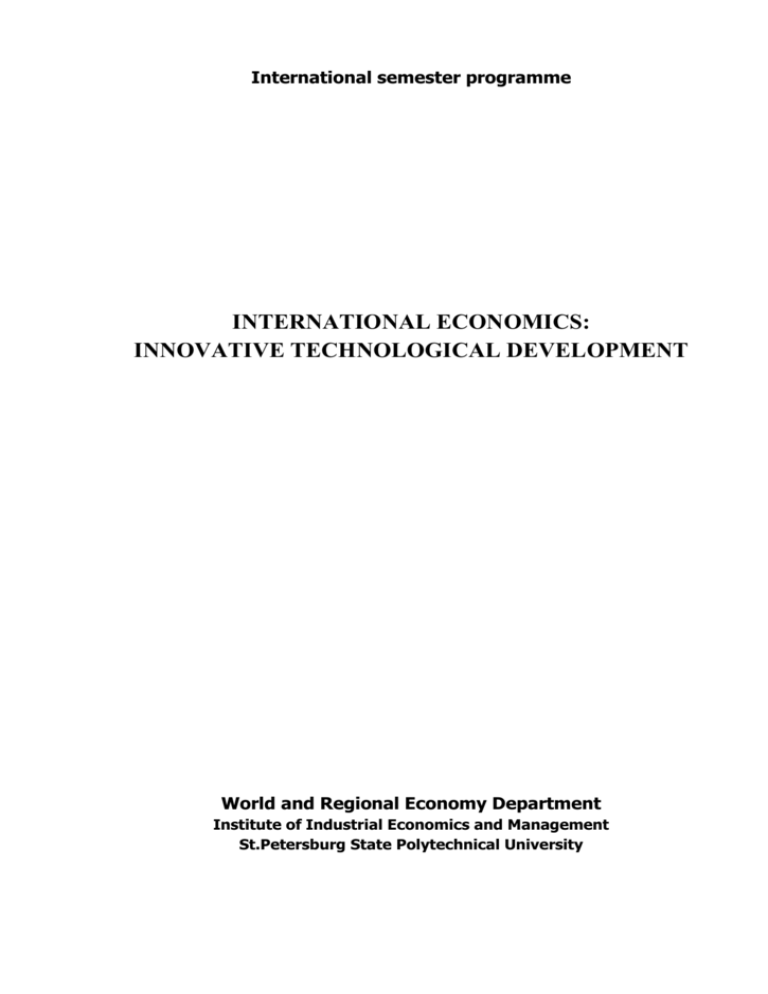
International semester programme INTERNATIONAL ECONOMICS: INNOVATIVE TECHNOLOGICAL DEVELOPMENT World and Regional Economy Department Institute of Industrial Economics and Management St.Petersburg State Polytechnical University The brochure is designed and edited by A.Kozlov, E. Vdovina, O. Antipova Syllabi of the courses are developed by A.Kozlov N.Didenko O. Budzinski D.Skripnyuk A.Teslya A.Kankovskaia K.Sorokozherdev N.Konakhina E.Rytova N.Sokolitsyna V.Merkulov K.Kikkas For further information please contact: World and Regional Economy Department 29/4, Polytechnicheskaya Str., St. Petersburg, 195251, Russian Federation Tel.: +7 (812) 550 4126 E-mail: wecon@fem.spbstu.ru www.wrecon.ru Introduction The international semester programme is taught at the Department of the World and Regional Economy, Institute of Industrial Economics, St.Petersburg State Polytechnical University Title of the programme: “International economics: innovative technological development” Objectives of the programme To enhance professional competences of economics and management students who are thinking of employment by international companies in Russia and Russian companies and organizations involved in international cooperation; To provide the participants with intercultural competences of business communication in Russia with representatives of other cultures when solving a wide range of professional management tasks. Language of instruction English WHY study the programme “International economics: innovative technological development”? This carefully tailored programme is aimed at the analysis and forecast of innovative technological development of national economies in line with the trends of the global economy, which enabled the students to acquire necessary professional competencies; The programme taught in English ensures a real international environment with both Russian and foreign lecturers; The programme is recognized as a semester abroad for foreign participants and a preparation for international academic mobility for Russian participants increasing opportunities to participate in international research projects and international grants; Studies in St.Petersburg in one of the best universities in Russia allow students to get to know the rich historical and cultural heritage of the city and to learn the socio-economic realities in practice; The programme ensures the development of professional intercultural communication skills, which provides both Russian and foreign students with an additional advantage in the international labour market. DESCRIPTION OF THE PROGRAMME Title of the programme: “International economics: innovative technological development” Program dates: beginning of February – mid-June Participants: international and Russian students Prerequisites: minimum two years of Bachelor level university studies, with good command of English Teachers: Lecturers of St. Petersburg State Polytechnical University; visiting Professors from European partner Universities Training methods: Study methods emphasize students’ active participation and involvement. Case studies and group discussions are an integral part of the learning process in addition to lectures. Credits: 30 ECTS credits per semester Programme: The program comprises compulsory and elective courses conducted in English. Compulsory courses are obligatory. Students can also choose elective courses from the list (min.5 students per a course) to get 30 ECTS credits. Compulsory Courses Economic growth and development 4.0 ECTS Strategic management of an innovative organization 3.5 ECTS International marketing 3.0 ECTS International financial management 4.0 ECTS International competition policy 3.0 ECTS ** International trade risk management 4.0 ECTS Elective Courses: Investment management and innovative activity 3.0 ECTS TNC in the global economy 3.0 ECTS Characteristics and perspectives of Russian industries 3.0 ECTS Socio-economic development of regions in Russia 2.5 ECTS Russian language 5.5 ECTS * Please note that program content is subject to change ** Course is taught by a visiting professor ECONOMIC GROWTH AND DEVELOPMENT Objectives Objectives of course are to develop a deep understanding of the processes concerned with economic growth and development. The analysis focuses on three fundamental questions. 1. Why are some economies so much richer than others? 2. What increases in real incomes over time? 3. What are the major problems, real conditions, and institutions across the developing world and how to approach them? Content The course starts with the Solow growth model of investigating effects of the division of output between consumption and investment on capital accumulation and growth. The course considers then the Solow model’s assumption that the saving rate is exogenous and fixed (the Ramsey model and the Diamond model). In the next part the new growth theory considers the model where technological progress arises from resources and the division of resources between the production of ideas and the production of conventional goods. It then considers the determinants of that division. The next part of the course considers the sources of the enormous differences in average incomes across countries. This material, which is heavily empirical, emphasizes the contribution of variations in the accumulation of physical and human capital and in output for given quantities of capital to cross-country income differences; the nature and meaning of development and underdevelopment and its various manifestations in developing nations; the context of major problems, such as poverty, inequality, population growth, the impact of very rapid urbanization and expansion of megacities, persistent public health challenges, environmental decay, and regions experiencing rural stagnation, alongside with the twin challenges of government failure and market failure. Teaching and learning methods The course comprises lectures supported by slides and group discussions; a project work is to enhance the application of knowledge to the real economic realities. ECTS/ Credits 4.0 Readings 1. Romer, David. Advanced macroeconomics / David Romer. — 4th ed. 2.Michael P. Todaro, Stephen C. Smith. Economic Development, 11th ed. Assessment Written exam STRATEGIC MANAGEMENT OF INNOVATIVE ORGANIZATION Objectives The aim of the course is to give the students knowledge in specifics of strategic management for innovative organisations and develop skills to formulate strategies for innovative organization in the international and Russian context. Content The course contains information on the following topics: types of strategies, strategy pyramid, corporate strategy, tools for corporate strategy choice, business strategy; definition of innovative organisations, innovative business idea evaluation and business definition; Russian business environment analysis: approaches and modern tools for strategic analysis; process of strategic management; practice in innovative organisation’s mission formulation, strategic goal-setting, SWOT analysis, development of professional tools for SWOT analysis; SWOT analysis for innovative organisations, questionnaires and check lists; strategy choice and implementation; strategy of growth for innovative organisation; strategy implementation and typical organisational structures of Russian companies; competitive strategies in the context of innovative organisation: cost leadership, focus and differentiation; examples of Russian and international innovative companies strategic choice; peculiarities of strategic leadership and decision-making process in Russian companies; Russian peculiarities of delegation; theoretical and practical aspects, barriers for delegation in Russia; relationship between manager and subordinates: Russian managerial practices and Russian managerial mentality. Teaching and learning methods Interactive lecturing promotes student participation. Exploration of the international and Russian approaches to strategic management through analysis of case studies and mini-projects development in teams activates the learning process. The class work will be carried out in small groups and presented in the classroom. ECTS/ Credits 3.5 Readings Porter M. Competitive Strategy: Techniques for Analyzing Industries and Competitors. NY.: The Free Press, 2006 Schilling M. Strategic Management of Technological Innovation. NY.: Irwin/McGraw-Hill, 2009. 320 p. Assessment Written exam Group work Class participation INTERNATIONAL COMPETITION POLICY Objectives The course provides insights into the economics of competition policy with a special focus on international markets and international business. Content Why competition policy? Restrictions of competition (cartels, monopoly power, etc.) in international markets and/or by international companies. How can national competition policies deal with international competition problems? EU competition policy as an example of international competition policy. Do we need a global governance of competition? International competition policy organizations: International Competition Network, World Trade Organization, OECD, etc. Teaching and learning methods Power point presentation combined with group discussions to activate students’ involvement. In addition, students will work in groups on case studies and the results will be presented in class. ECTS/ Credits 3.0 Readings O. Budzinski, The Governance of Global Competition, Cheltenham: Elgar 2008. S. Bishop & M. Walker, The Economics of EC Competition Law: Concepts, Application and Measurement, London: Sweet & Maxwell. M. Motta, Competition Policy: Theory and Practice, Cambridge: Cambridge University Press. Assessment Written exam Group work Class participation INTERNATIONAL FINANCIAL MANAGEMENT Objectives The main objective of the course is to make students acquainted with major financial markets and their instruments: futures, forward contracts, options and the like Content The course focuses on the following topics: - The role of international financial management in the management system; - International foreign exchange market, typical currency operations, arbitrage, exchange rate, interest rate parity, purchasing power parity. - International banking of today, banking offices, banking system, interbank financial market, capital adequacy standards, eurocurrency markets. - International bond markets, types of foreign bonds, eurobonds. - International equity markets, market capitalization, liquidity, cross-listing of shares, factors affecting international equity returns. - Options markets, currency options, valuations of options. - Currency and interest rate swaps Teaching and learning methods The lectures will cover all the theoretical questions with the help of examples. During practical exercises the students will train their problem-solving skills. Some self-study is also needed ECTS/ Credits 4.0 Readings 1. Cheol S. Eun, Bruce G. Resnick, International financial management, McGraw-Hill, 2008 2. Geert J. Bekaert, Robert J. Hodrick, International financial management, Prentic Hall, 2011 3. J. Madura, International financial management, South-Western College Pub, 2009 Assessment Written exam – final test INTERNATIONAL MARKETING Objectives The main objective of the course is to investigate strategies and techniques of marketing in the company’s activity in foreign and global markets. By the end of the course students will be able: to analyze consumer behavior in global markets in terms of cross-cultural values; to develop an international marketing strategy that meets internal corporate capabilities and the external environments in the target markets; to make decisions on the most appropriate international marketing entry method for their international target markets; to adapt brand, product, marketing communication, pricing and placement strategies. Content The course examines foreign companies’ entry into the Russian market and Russian companies' entry into foreign markets. This requires an insight into the theory and its application to the development of strategies and tactics of international marketing. The first part of the course is Strategic Marketing involves discussions of the concept and the content of a marketing strategy, the algorithm of its creation and realization. In the practical part of the course we examine strategies of Russian and foreign companies. The second part of the course includes a theoretical and practical overview of the principles and methods of Operational Marketing. We consider the cross-cultural aspects of marketing, differences in marketing activities in Russia and other countries; we analyze the impact of globalization on marketing. Teaching and learning methods Classroom lectures are supported by slides, video, class discussion, and project work. The course includes a market research which will be carried out in small groups, with the results being presented and discussed in the classroom. ECTS/ Credits 3.0 Readings 1. Doole I., Lowe R. International Marketing Strategy. 2012. 2. Materials from the websites: - spb.rbc.ru - www.geert-hofstede.com - corporate websites Assessment Written exam Group work INTERNATIONAL TRADE RISK MANAGEMENT Objectives The main objective of the course is to make students familiar with various types of risk that the firm encounters on the international markets. The course aims to teach students how to deal with the most common risks using financial instruments Content The course covers several major topics. It starts with the general overview of financial markets, financial instruments, and risks classification. The course focuses only on those risks that can be estimated, controlled, and reduced. The second part is fully dedicated to economic risk and its subtype known as operational risk. Here the influence of exchange rates on the day-to-day operations and overall cash flow is examined. The third part deals with transaction risk and different ways of its minimization: forward hedging, capital market hedging and option hedging. The final part concerns translation risk, its origins and the ways of reducing it. Practical examples are considered when examining types of risk Teaching and learning methods The lectures cover theoretical questions supported by examples. During practical exercises students will train their problem-solving skills. Self-study is also needed ECTS/ Credits 4.0 Readings 1. A. Grath The handbook of international trade and finance, Nordia Publishing, 2005 2. E. Topritzhofer International business transactions, Publishing House Freya KG, 2010 Assessment Written exam – final test INVESTMENT MANAGEMENT AND INNOVATIVE ACTIVITIES Objectives The course provides students with the theoretical knowledge and practical skills in investments management. The course is aimed to develop skills of investment feasibility studies and to manage investment and innovative projects. Content The course gives an insight into the methodology and modern methods of investment feasibility studies. A particular attention is paid to the choice of funding sources, their impact on project performance indicators, a joint project justification of financing and investment and building an investment portfolio. The problem of excluding real options when deciding on the feasibility of projects, the impact of inflation, and risk assessment methods are addressed during the course. Teaching and learning methods The course is taught through lectures supported by Power Point presentation and class discussions. Short tasks or problems will be given for class analysis and self-study. The course includes the development of projects for small groups, and the results are presented and discussed in class. ECTS/ Credits 3.0 Readings Richard A. Brealey, Stewart C.Myers: Principles of Corporate Finance, Irvin/McGrawhill. 2008. Sharpe, W. F., Alexander, G. J./Bailey, J. V. Investments, Upper Saddle River, NJ: Prentice Hall. 1999. W. Behrens, P. M. Hawranek. Manual for the preparation of industrial feasibility studies. - Vienna, 1991. Assessment Written test Group work Class participation CHARACTERISTICS AND PERSPECTIVES OF RUSSIAN INDUSTRIES Objectives The objectives of the course are to describe Russian industries and the peculiarity of its development in connection with historical facts. Content Our course consider the main Russian industries and their development in the process of transition from Soviet-type system to market –oriented economy . This process was arguably the most important development in the last quarter of the twentieth century. The nature and the implication of this transition continue to preoccupy policy markers around the world and represent a major theme of academic research. To one degree or another all lectures address the effects of historical and especially Soviet legacies on the relevant aspects of Russian economy and describe its current state and future prospects. The following topics are going to be discussed: -Russia’s Dependence on Resources -The Russian Oil Sector -The Russian Natural Gas Sector -The Russian Electricity Market -The Economics of Mineral Resources Teaching and learning methods Lectures supported by slides, project work and self-study assingnments ECTS/ Credits 3.0 Readings The Oxford Handbook of the Russian Economy / Ed. Michael Alexeev and Sholmo Weber. 2013 Assessment Written exam Group work SOCIO-ECONOMIC DEVELOPMENT OF REGIONS IN RUSSIA Objectives The main objective of the course is to analyze Russian regions’ specific socio-economic conditions. After completing the training, students esquire skills to identify problems in regional business environment, to suggest solutions with regards to socio-economic effectiveness, risk estimates and possible future growth. They will be able to apply contemporary methods to estimate and analyse indicators of regional socio-economic development. Content The course contains information on the following topics: territorial structure of Russia; different kinds of regions in Russia; main socio-economic indicators of regions; quality and quantity of regional recourses (including human resources); historical aspects of allocation social and economic objects; differences between East and West parts of Russia; Macro areas of Russia, their structure and peculiarity; special features, potentials, perspectives and disproportions in development of Russian regions; regional socio-economic policy and its effectiveness; regional business environment and risks. Teaching and learning methods The course is divided in classroom lectures supported by slides, project work and class discussion. The class work and project work will be carried out in small groups and include analyzing of Russian regional statistic and different kinds of maps. Work results will be presented in the classroom. ECTS/ Credits 2.5 Readings Recommended reference websites include: - raexpert.ru/ - riarating.ru/ - http://www.gks.ru/ - http://government.ru/ - http://www.consultant.ru/ Assessment Written exam Group work Class participation TRANSNATIONAL CORPORATIONS IN THE GLOBAL ECONOMY Objectives The objective of the program is twofold. First, the program will provide an understanding of the processes of transnationalization influence on the economy of domestic and foreign countries and world economic development. Second, it aims at analyzing practice of realization of global strategic opportunities of companies and the processes of transnational corporation development. Content The course gives the students skills of analysis threats and opportunities of production transnationalization for the world region and country economy development. The course introduces the practice of analysis of TNC foreign operations and TNC role in the world economy based on basic indicators of the global economy and production transnationalization, such as: Global product growth; volume of world production and speculative capital; Dow Jones Industrial Average (DJIA); Standard &Poors 500 Index (S&P500); world unemployment rate; world export and import growth rate; gold and oil barrel price; transnationalization index (TNi). Case-studies give opportunities to analyse and collect different types of applied TNC global strategies; and estimate external and internal factors which affect global strategy choice of company. Teaching and learning methods The course implies an application of active and interactive education forms. The special accent will be done on competency building approach and case studies. ECTS/ Credits 3.0 Readings Recommended reference websites include: Transnational Corporations Journal. Published three times http://unctad.org/en/pages/publications/Transnational-Corporations%28Journal%29.aspx International economic news www.economist.com Assessment Written exam Group work Class participation a year. RUSSIAN LANGUAGE (LEVEL 1, beginners) Objectives By the end of the course students should get basic reading, writing, listening and speaking skills. Students will be able: to read and understand some simple texts; to understand Russian native speakers (in the bounds of the covered lexical and grammar material); to maintain dialogues on particular topics using words and grammar studied. Content Phonetics Peculiarities of the Russian articulate base. Intonation. Grammar The noun. The category of gender. Animate and inanimate nouns. The adjective. Declension of nouns and adjectives in singular. The pronoun. Personal, possessive and demonstrative pronouns. Declension of pronouns in singular. The numeral. Ordinal and cardinal numerals. Declension of ordinal numerals. The verb. Verbs in the present, past and future tenses. Order of words in a Russian sentence. Declarative, interrogative and negative sentences. Simple and compound sentences. Conjunctions что, потому что, поэтому, но, а, и. Lexical topics Biography, family, getting round the city, shopping, restaurant. Teaching and learning methods Practical training in class. Grammar and words are practiced through various types of exercises (written and oral), dialogues and texts, which employ the most frequently used phrases and words in a variety of everyday contexts. Self study ECTS/ Credits 5.5 Assessment Written and oral examination Group work Class participation Individual work RUSSIAN LANGUAGE (LEVEL 2) Objectives By the end of the course students should improve their reading, writing, listening and speaking skills. Students will be able: to improve their understanding of Russian native speakers (in the bounds of the covered lexical and grammar material); to maintain dialogues on particular topics using words and grammar studied. Content Grammar The noun. Declension of nouns in plural. The adjective. Declension of adjectives in plural. The pronoun. Declension of possessive and demonstrative pronouns in plural. The verb. Verbal aspects in the past and future tenses. The imperative: formation and functions. Verbs of motion. Transitive and intransitive verbs of motion. Verbs of motion without prefixes. Verbs of motion with prefixes. Compound sentences. Conjunction который. Lexical topics Getting round the city, travelling, shopping Teaching and learning methods Practical training in class; Grammar and words are practiced through various types of exercises (written and oral), dialogues and texts that employ the most frequently used phrases and words in a variety of everyday contexts. Self study ECTS/ Credits 5.5 Assessment Written and oral examination Group work Class participation Individual work STUDY ENVIRONMENT Accommodation: triple accommodation in two-room apartment with shared facilities and kitchen in a comfortable student hostel. Application procedure: Application form for the program can be requested at e-mail intprogram@imop.spbstu.ru. Filled in application form should be sent by e-mail. Please enclose the following documents: transcript of records copy of international passport (for visa arrangements) DEADLINE for the application: October 25 Financial terms: Program is open for all types of applicants: Russian and foreign students (more information at http://www.wrecon.ru) exchange students (more information at http://www.wrecon.ru) Tuition fee: The tuition covers course participation, supplies, including registration fee For further information, please contact: St. Petersburg State Polytechnical University Institute of Industrial Economics and Management World and Regional Economy Department 29, Polytechnicheskaya Str., St. Petersburg, 195251, Russia Tel.: +7 (812) 550 41 26 E-mail: wecon@fem.spbstu.ru www.wrecon.ru



